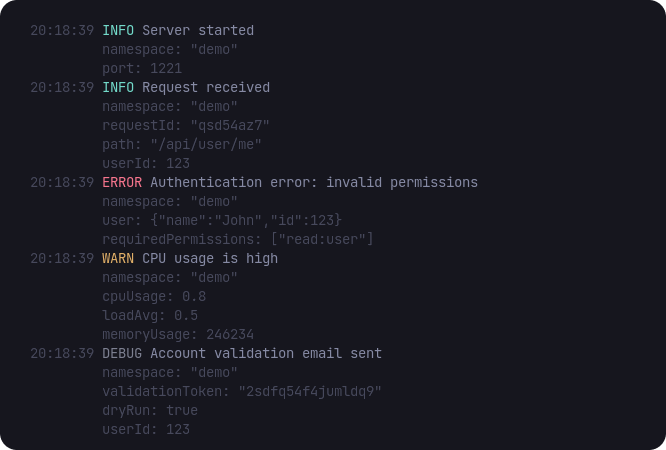@crowlog/logger v1.2.1
Features
- Ultra lightweight - Crowlog is very lightweight (less than 1kB minified + gzipped, see comparison).
- Zero dependencies - No runtime dependencies, just pure JavaScript.
- Extendable - Crowlog is designed to be extendable, so you can add your own transports and plugins to it.
- Simple - Crowlog is designed to be simple and easy to use.
- Fully typed - Crowlog is fully typed, so you can get autocomplete and type safety when using it.
- Any environment - Crowlog works in any environment, including Node.js, browsers, and the edge.
- Testing friendly - Crowlog is designed to be testing friendly, so you can easily test your logs with the in-memory transport.
- Slightly opinionated - Crowlog is designed to be slightly opinionated, so it has a default transport and some plugins.
- Pretty logs - Crowlog pretty log command to display logs in a more readable format for development.
Installation
# pnpm
pnpm install @crowlog/logger
# npm
npm install @crowlog/logger
# yarn
yarn add @crowlog/loggerUsage
Basic usage:
import { createLogger } from '@crowlog/logger';
const logger = createLogger({ namespace: 'my-app' });
logger.info('Hello world');
logger.error({ error: new Error('...') }, 'Something went wrong');!NOTE The logging interface is either a single string message or a data object and a message string tuple.
logger.info('Hello world'); logger.info({ foo: 'bar' }, 'Hello world');
Methods
Crowlog logger provides 4 different logging methods: debug, info, warn, and error.
logger.debug(/* ... */);
logger.info(/* ... */);
logger.warn(/* ... */);
logger.error(/* ... */);Child logger and factory
Crowlog logger provides a createChildLogger method to create a child logger that inherit the configuration of the parent logger.
import { createLogger } from '@crowlog/logger';
const logger = createLogger({ namespace: 'my-app' });
const childLogger = logger.createChildLogger({ namespace: 'child' });Alternatively, you can use the createLoggerFactory to create a logger factory that can be used to create child loggers with the same configuration.
import { createLoggerFactory } from '@crowlog/logger';
const createLogger = createLoggerFactory({ transports: /* ... */, plugins: /* ... */ });
const logger = createLogger({ namespace: 'child' });Transports
A transport specifies where the logs are sent to. By default, Crowlog uses the stdout transport.
Stdout transport
The stdout transport writes the logs to the standard output stream. It's the default transport.
import { createLogger, createStdoutLoggerTransport } from '@crowlog/logger';
const logger = createLogger({ namespace: 'my-app' });
// equivalent to
const logger = createLogger({ namespace: 'my-app', transports: [createStdoutLoggerTransport()] });
logger.info('Hello world');By default, the stdout transport serializes the log args to a JSON string and use the console.log function to write the logs to the standard output stream for cross-compatibility with most environments.
You can customize the serialization and the write function by providing a custom serialize and write function to the transport.
import { createLogger, createStdoutLoggerTransport } from '@crowlog/logger';
const logger = createLogger({
namespace: 'my-app',
transports: [
createStdoutLoggerTransport({
serialize: ({ level, message, timestampMs, namespace, data }) => `[${level}] ${message}`,
// default : (args) => JSON.stringify(args),
writeToStdout: (serializedLog) => process.stdout.write(serializedLog),
// default : (serializedLog) => console.log(serializedLog),
})
]
});In-memory transport
The in-memory transport is a transport that stores the logs in memory. It is useful for testing and for debugging.
It provides a getLogs method to retrieve the logs.
import { createLogger, createInMemoryLoggerTransport } from '@crowlog/logger';
const inMemoryTransport = createInMemoryLoggerTransport();
const logger = createLogger({ namespace: 'my-app', transports: [inMemoryTransport] });
logger.info('Hello world');
logger.error({ foo: 'bar' }, 'Something went wrong');
// get the logs
const logs = inMemoryTransport.getLogs();
/*
[
{
level: 'info',
message: 'Hello world',
timestamp: 1738878633123,
namespace: 'my-app',
data: {},
},
{
level: 'error',
message: 'Something went wrong',
timestamp: 1738878633123,
namespace: 'my-app',
data: { foo: 'bar' },
},
]!TIP The
getLogsmethod accepts aexcludeTimestampMsoption to exclude the timestamp from the logs for better DX in writing more deterministic tests.const logs = inMemoryTransport.getLogs({ excludeTimestampMs: true });
Plugins
A plugin permit to extend the logger with custom functionality.
Async context plugin
The async context plugin is a plugin that adds the async context to the logs.
Async context plugin
Permit to easily add context data to the logs, it's useful in http servers to add log context that follow the lifecycle of a request (like a request id).
!IMPORTANT This plugin is only available environment that supports
async_hookslike Node.js or cloudflare workers with compatibility flags.
Install the plugin:
# pnpm
pnpm install @crowlog/async-context-plugin
# npm
npm install @crowlog/async-context-plugin
# yarn
yarn add @crowlog/async-context-pluginUse the plugin:
import { createLogger } from '@crowlog/logger';
import { createAsyncContextPlugin, addLogContext, wrapWithLoggerContext } from '@crowlog/async-context-plugin';
const logger = createLogger({ namespace: 'my-app', plugins: [createAsyncContextPlugin()] });
// create a context, some initial context data can be added
wrapWithLoggerContext({ requestId: '123' }, () => {
addLogContext({ userId: '123' });
// logs within the context will have the requestId and userId
logger.info('Hello world');
});More details about the async context plugin can be found in the async-context-plugin README.
Pretty logs
Crowlog provides a pretty log command to display logs in a more readable format for development.

# using node
node index.js | npx crowlog-pretty
# using tsx
tsx watch index.ts | npx crowlog-prettySee the pretty README for more details.
Comparison
| Library | Runtime dependencies | Bundled size |
|---|---|---|
| @crowlog/logger@1.0.0 | 0 dependencies | 1.3kB (674B minified + gzipped) source |
| pino@9.6.0 | 11 dependencies | 7.5kB (2.9kb minified + gzipped) source |
| winston@3.17.0 | 11 dependencies | 147.9kB (37.4kB minified + gzipped) source |
| bunyan@1.8.15 | 0 dependencies | 15.7kB (5.6kB minified + gzipped) source |
License
This project is licensed under the MIT License. See the LICENSE file for more information.
Credits
This project is crafted with ❤️ by Corentin Thomasset. If you find this project helpful, please consider supporting my work.
The icon is the Logs icon from the Tabler collection